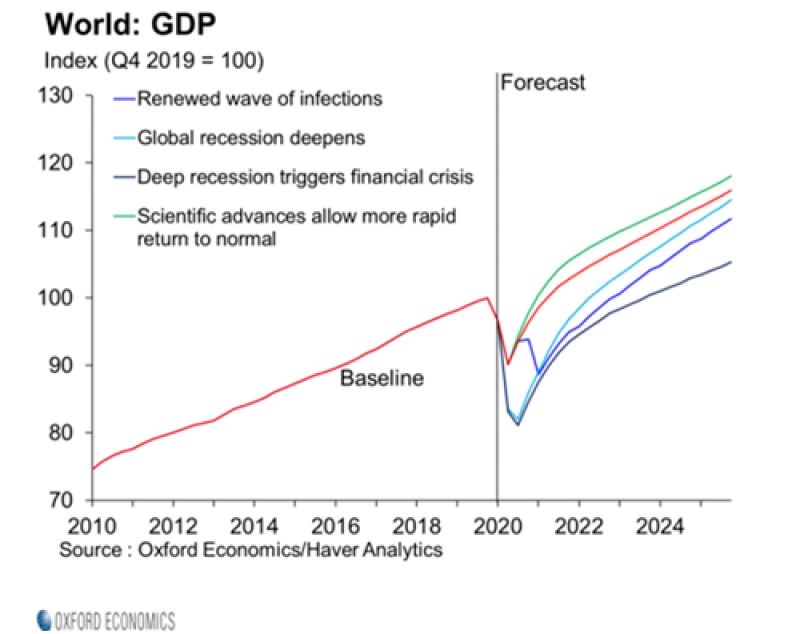
Açıq mənbələrdən foto
The lack of a coronavirus vaccine suggests that the recession in the economy at the international level will continue for another one year under optimistic scenarios. However, it is possible that it will be more critical than the current situation.
According to the latest forecasts released by the UN Department of Economic and Social Affairs, the world’s GDP will fall by 5.2 percent by the end of this year. According to the organization's experts, this crisis is the worst contraction in economic activity since the Great Depression (1929-33) and much worse than the global financial (mortgage) crisis of 2008-2009. Problems will be especially severe in the field of employment. About 1.6 billion workers in the foreign sector will be at risk of losing their livelihoods. (Interview with Nikhil Seth, the Executive Director of the UNITAR, United Nations Institute for Training and Research)
According to the latest IMF report for 2020, by the end of this year, global GDP will decline by 3-4.9 percent. These declines will range from 6.1 to 8% for developed countries and 1-3% for developing countries, 5.9 to 8% for the United States, and 7.5 to 10.2% for the eurozone. Even if a COVID-19 vaccine is found this year, there may be attempts by the economy to return to previous levels in the next two years.
Oxford Economics’ report: Another recent report came from Oxford Economics. The report, "Scenarios for the Post-Pandemic", contains some very interesting points. An expert group analyzing the trends in the global economy shows that the world’s GDP is shrinking by 5 percent. In the report, we examine these basic economic risks:
Basic Scenario: Global GDP losses are projected to be huge by the end of this year.
In the second scenario, there will be an improvement in the middle of the virus wave. This will not only create economic risks but also seriously affect the health of the people.

In the next 4 years, the rise to the previous level is expected. In the first quarter of 2021, there may be an improvement. As the world economy grows by 7.1% in 2021, global inflation is expected to rise again after falling below 2% by the end of this year. We do not expect any increase in interest rates until 2023 after the European Central Bank creates flexibility in collateral needs for banks. Meanwhile, we expect the US Federal Reserve to fluctuate around almost zero percent.
According to a report by Oxfam, half a billion people worldwide could lose their jobs due to the coronavirus. As trade turnover shrinks, businesses have significantly reduced the supply of goods and services. According to the World Trade Organization, the volume of trade in goods in the first quarter decreased by 3 percent compared to the same period last year.
The main trends in the world economy are that no segments collapse, all sectors surrounding the system are damaged in similar proportions. Economist Daron Acemoğlu described this global situation in his own way: “In every recession, companies go bankrupt, others continue. This is natural. In the United States, for example, an average of 3 percent of companies went bankrupt during each recession. Now the problem is that not only economically fragile companies but also other companies affected by weak links in the supply chain are starting to go bankrupt.”
Kissinger's three proposals
US diplomat and public figure Henry Kissinger, on the one hand, spoke of the need to fight the pandemic with all our might, and on the other hand, stressed the need to prepare for an “entry into the new world” after the virus, talks about “building the future while managing the crisis”. Kissinger, a 96-year-old diplomat, draws conclusions from the Marshall Plan and the Manhattan Project and makes three proposals to the United States:
- Support global resistance to the virus;
- Meet the losses of the world economy;
- Protect the principles of the liberal world order;
Kissinger sees the United States as a donor implementing all three proposals and expresses expectations. This means that global powers, including the United States, must take joint preventive measures against the coronavirus. This resistance is a joint effort. The United States must provide resistance to COVID-19, be a donor to repair the damage, and make a significant contribution to strengthening liberal tendencies.
Mohammed Talibli















Leave a review